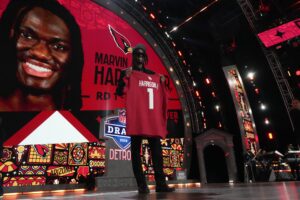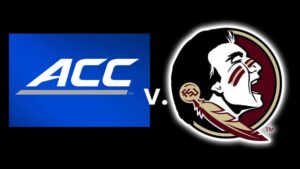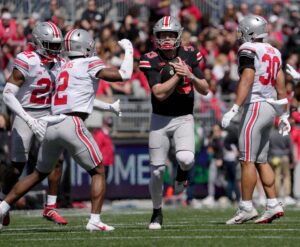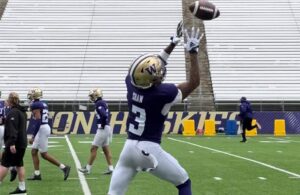Tennessee’s Most Important Games Of The Last Thirty Years
Tennessee’s win over Florida was important for a myriad of reasons. It has the potential to affect the program for many years to come. From the confidence gained by a big win to the impact on the record number of recruits on official visits, Tennessee fans may look back in a few years and see this game as the first step towards a championship march.
Rarely do programs realize the importance of games beforehand. Often times, you have to enlist the aid of history and retrospect to identify those games that signaled a sea-change for a program. With that in mind, Last Word on College Football looked back to see the most important games in the last thirty years for the Tennessee Volunteers.
Some signaled a rise and some signaled a fall. But they all signaled a new era on Rocky Top.
Tennessee vs. Florida, 2016: The First Step?
Of course it’s too early to tell if this game actually is as pivotal as billed. But it’s not a stretch to see the importance of this game. First, it gives Tennessee the inside track to an SEC East Championship. Tennessee now has essentially a two game lead on Florida, one of their two most likely competitors in the East. Secondly, there was a record number of recruits on official visits on Saturday in an atmosphere that — even by Neyland Stadium standards — was electric. But most importantly, this game may have given the Volunteers a competitive momentum, team psyche-wise, that propels them forward for the remainder of the season. The resiliency and steadiness of Tennessee’s comeback is clear evidence of the difference between where this team is and where they were when Butch Jones took over this program.
Tennessee vs. Kentucky, 2011: Rocky Bottom
The “Tyler Bray” game. Looking back, this was the game that signaled the beginning of the end of the Derek Dooley era. Tennessee was 5-6 entering the last game of the season in Lexington. Tennessee had defeated Kentucky every year since 1985, and has beat Kentucky every year since. The Vols needed one last win to earn a bowl bid, which of course earns valuable extra practices for a team that needed every repetition it could get. Tennessee was facing a Kentucky team was yielding an average of 22 points per game and 366 yards per game. Additionally, the Wildcats were forced to play with a converted wide receiver at quarterback after injuries prevented their top two quarterbacks from dressing out. Tennessee came out and looked completely uninterested in winning that day. Not even the chance at a bowl game was enough to motivate an offense led by the strong-armed Tyler Bray. Tennessee ended the season at 5-7, the worst conference record since joining the SEC (1-7), and it was clear that Derek Dooley had little — if any — influence in the locker room. This was unquestionably the lowest point in Tennessee’s recent decade of mediocrity.
Tennessee vs. Vanderbilt, 2005: Decent to Mediocrity
This is the game that represents the beginning of the second worst era in the history of Tennessee football. Tennessee hadn’t won less than eight games in a season since 1988. Phillip Fulmer was still recruiting at a high level, but with this loss the luster of the 1998 National Championship was starting to fade. In-state rival Vanderbilt came into Neyland Stadium and beat the Volunteers 28-24, marking Vandy’s first win in the rivalry since 1982. At the time, this game — and this season — seemed like a blip on the radar. Tennessee would go on to win 19 games over the next two seasons, but this game expended all capital that Fulmer had with school and department administration. Athletic Director Mike Hamilton was looking for a fresh, more energetic leader for the program that could generate advertising and revenue. After this game, Hamilton would make the move at the next available opportunity, which would come less than three seasons later. Tennessee went 5-7 once again and would miss a bowl game for the second time in four years. Hamilton would unceremoniously fire Fulmer before the season ended.
Tennessee vs. Alabama, 1995: Prelude To A Championship
It would be easy to list the 1998 National Championship win over Florida State, the 1998 game against Arkansas (“The Stoerner Stumble” game), or either of the 1998 wins over Florida or Alabama as the key to winning the 1998 National Championship. But the march to that championship started in Birmingham, Alabama on the third Saturday in October of 1995. It had been almost a decade since Tennessee had won against Alabama. Tennessee has long suffered from playing second fiddle in the SEC to Alabama, trailing only the Crimson Tide in almost every meaningful team statistic in the conference. Sophomore quarterback Peyton Manning would take the Volunteers into Legion Field and walk away with a 41-14 thumping of the Crimson Tide. The Vols were now clear of the Tide and only the Gators threatened the Vols for supremacy in the SEC for the next eight years. Tennessee would finish the season 11-1, win seven straight against Alabama, and go 45-5 over the next four seasons — including the 1998 National Championship. The Vols learned how to win the big game that night, and it showed. A different Tennessee team emerged from the dilapidated Legion Field locker room that night, completely different than the Tennessee team that had entered it earlier that afternoon.
Tennessee vs. Miami, 1986 Sugar Bowl: Tennessee Returns to National Prominence
Johnny Majors left Pittsburgh, where he had won a national championship, to return to his alma mater, Tennessee. Here he hoped to bring Tennessee back to national prominence. Majors replaced Bill Battle, who hadn’t won more than eight games in four years. While Battle’s tenure wasn’t terrible, it wasn’t as successful as his predecessor, Doug Dickey. It took Majors a few years to get things on track. His 1985 “Sugar Vols” team, however, is one of the most memorable Tennessee teams in memory. Tennessee upset top-ranked Auburn in the second game of the season and beat Alabama for the fourth straight time. Future head coaches Phillip Fulmer, David Cutcliffe and Ron Zook were on Majors’ staff. The Vols finished 9-1-2, with a loss to seventh-ranked Florida. But the team would finish the season with a resounding defeat of top ranked Miami in the 1986 Sugar Bowl. On the national stage, Majors would lead Tennessee back to national prominence by absolutely dominating the championship favorite Hurricanes. Tennessee would win eight games or more in 18 of the next 20 seasons.






